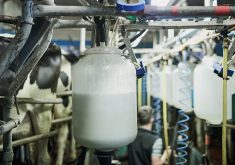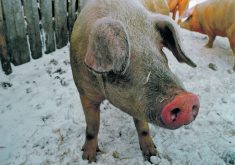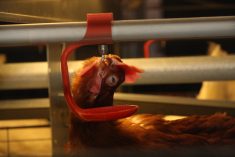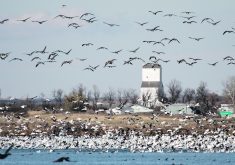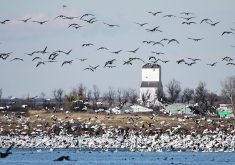Fears that avian influenza will return to infect domesticated birds as migratory birds head south are being realized.
All four western provinces are reporting cases and poultry producers are bracing for another wave of the bird flu.
Between Sept. 12 and 17, four farms in Alberta have had positive cases of avian influenza reported with three in Saskatchewan and one each in Manitoba and British Columbia.
It’s likely the beginning of another wave, said Shayan Sharif, professor of pathobiology at the Ontario Veterinary College, part of the University of Guelph.
Read Also

Saskatchewan puts crown land auction on hold
Auctions of Saskatchewan crown lease land are once again on hold.
“We’re seeing some early signs that this is coming back again. That’s what we expected,” he said.
More than two million birds were impacted primarily in the poultry industry by the outbreak in spring with nearly half of those cases occurring in Alberta.
Sharif said the Canadian Food Inspection Agency has been successful in its “stamp out” policy in dealing with this year’s outbreak that has hit all provinces with the exception of Prince Edward Island.
“It’s basically testing flocks and slaughtering them,” he said. “And I think they’ve done a really good job containing the virus.”
Large-scale culling isn’t necessarily the only way to deal with the virus. Some countries either look at vaccinating poultry flocks or have implemented such a strategy.
The United States is one of those countries considering an immunization policy for poultry. But there are issues there and in Canada as to how such a program would affect export markets because it would be difficult to distinguish between poultry that have been exposed to the virus and those that have developed natural immunity.
While herd immunity could develop in wild bird populations, that’s not likely to be replicated in domestic poultry because the life cycle of broiler chickens is measured in weeks, he said.
If a vaccination program in Canada is initiated, Sharif said it would be practical to immunize breeder and egg-producing poultry, as well as those in high-risk regions rather than an industry-wide program.
“I think we need to have a good discussion now — not next year but now — about the pros and cons of vaccination against avian influenza. Specifically, this particular strain appears to be behaving erratically in an unpredictable manner,” he said.
Sharif said in western provinces, the virus isn’t being spread between poultry farms with many infected operations hundreds of kilometres apart.
“That actually makes the life of CFIA quite complicated and very complex.”
But for now, it’s a guessing game as to whether this year’s spread of avian influenza is a harbinger for things to come or if it will simply peter out.
“The reality is it won’t and hasn’t,” said Sharif. “Since the ’90s, we’ve had ups and downs of outbreaks here in North America and across the globe, so I don’t think the virus is going to go away.”
It is likely that variants of the disease will remain in bird populations with some strains more virulent than others, similar to seasonal flu or COVID-19 in humans.
“If that is the case, it depends on our luck as to whether or not the virus would decide to go one way or the other,” said Sharif.
The fear is if the virus is left unchecked, the potential of spread to humans remains a possibility.
Sharif said researchers are looking at computer modelling to predict possible outbreaks but that can only look at the short-term future and cannot predict well in advance of another wave.
B.C. has announced it will provide 11 information sessions from now until November to help educate small flock owners on how to prevent, recognize and report the virus.





